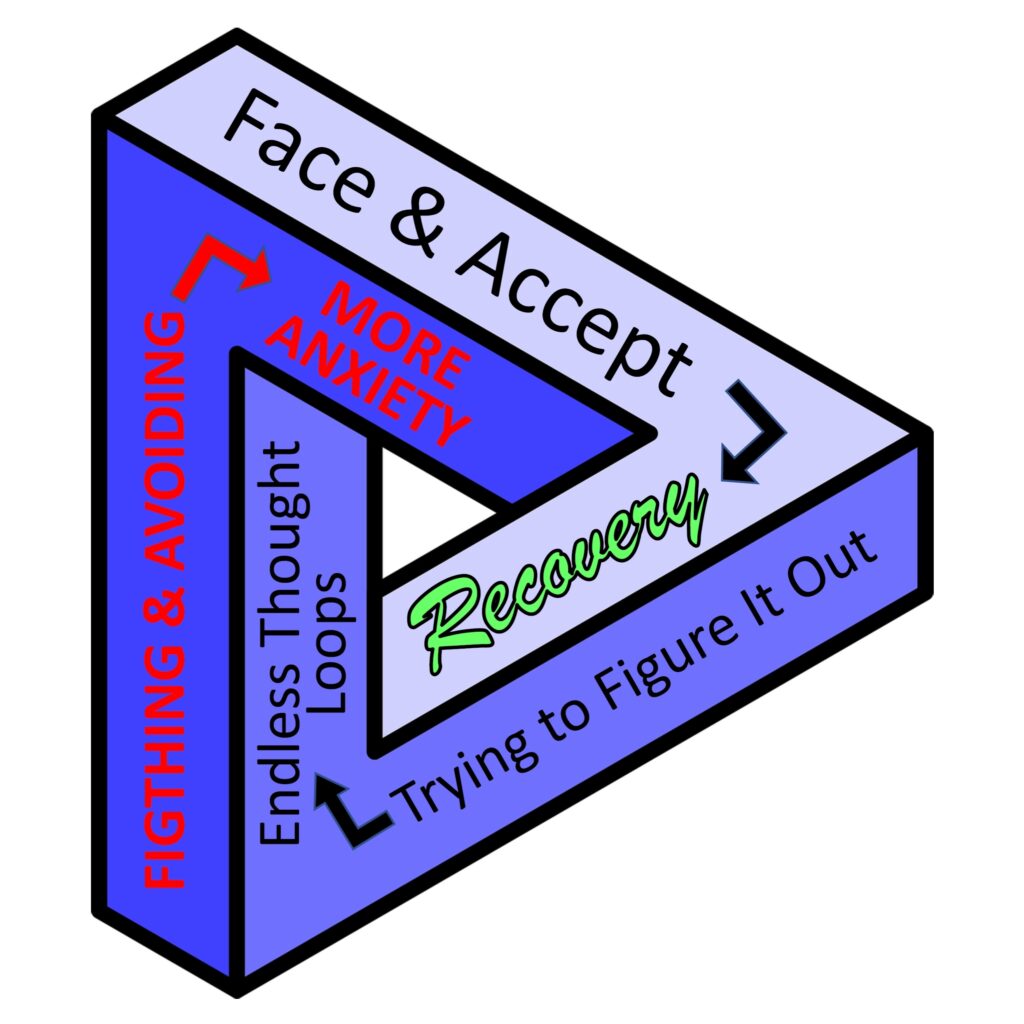I have found recovery from anxiety to be full of paradoxes – where I was required to think in the opposite way to what felt normal, opposite to the way I wanted to think. But I think the biggest paradox of all, and the one which most of us struggle with, is this…
Our primary goal when we seek recovery is to find a way to make our symptoms to go away. And yet the first instruction we get from the acceptance method is to face and accept the symptoms, to embrace them.
This makes no sense to us at this time. After all, how could embracing the symptoms help, when we are trying to get rid of them? Isn’t it the opposite of what we should be doing?!
Those who have recovered from anxiety, or are well along their journey to recovery, tell us to turn towards our symptoms and our suffering, to walk into it, to allow it to be there for as long as it wants, even to WELCOME it!!! In other words, we are told to do the exact opposite of what we thought we wanted when we sought recovery. This is THE paradox. The biggie.

It is by learning to face, embrace, and sit with our anxiety, fears, and other emotions, without trying to get rid of them, that we teach our brain that anxiety is not dangerous and not something to be feared. When we lose our fear of it, we stop reacting to it. When we stop reacting to it and fighting it, it quietens down. And when we truly accept it, it is free to leave.
Why This Paradox Makes Recovery a Challenge
Paradoxes are hard to accept, particularly for a tired and sensitized mind. In the beginning we are often quick to hear the paradoxical advice. But we still go immediately back to fighting and avoiding our symptoms, and wishing them away. This is both from fear and habit.
We hear the instruction to face and accept our symptoms, but we just can’t bring ourselves to do it. Or perhaps we feel we simply cannot do it.
We can. But it takes a while. It takes lots of practice, and usually a number of setbacks before we can finally and fully embrace this paradox, and face and embrace our symptoms. The tendency is to give up on this process before we see enough improvements to encourage us to continue. Instead, we go back to looking for a simpler, quicker way to recover. We go back to trying to figure it out, fighting, and avoiding or suppressing our symptoms.
How Recovery Progresses
Tolerating
If we give up fighting, and stick with the acceptance method, we go through a phase of tolerating our symptoms, before we are able to truly surrender and welcome them.
Few of us are very good at accepting and working with paradoxes, at least in the beginning. We like logic and certainty. We want to see how things will work, rather than proceeding on trust. Add to that how our anxious and sensitized minds struggle with even the simplest ideas. So it is understandable that the instruction to face and accept our anxiety takes time to sink in.
Our tired minds are very quick to hear the paradox, respond with “OK I understand”, and then go immediately back to the familiar and comfortable place of wishing the symptoms away. We “put up with” the symptoms, but beneath that veneer of acceptance we still just want them to go away.
Putting up with is resignation, not acceptance. That is why we must learn to embrace and welcome the symptoms if we wish to truly accept them.
Acceptance
When we progress further, we come to understand the paradox. We learn that by fully accepting the symptoms, welcoming them, allowing them to stay as long as they want, walking into the heart of the storm and surrendering, we actually find the peace we were seeking all along.
This final step is tenuous at first. It is easily disrupted by us forgetting the paradox that got us to that point, and slipping back into old habits of wishing or pushing the symptoms away. It is also vulnerable to a sudden increase in stress from events in our lives. Hence, we can still be thrown into a setback.
Recovery
It is only when we have built up our right inner voices sufficiently and ingrained this apparently “paradoxical” way of thinking (welcoming the symptoms each and every time), that we reach the place called “recovery”.
It is the powerful right inner voices that remind us not to slip back into old habits of fighting or trying to figure it out. They give us the strength to face whatever comes our way. These inner voices of truth and acceptance look after us whenever we need it in the future.







